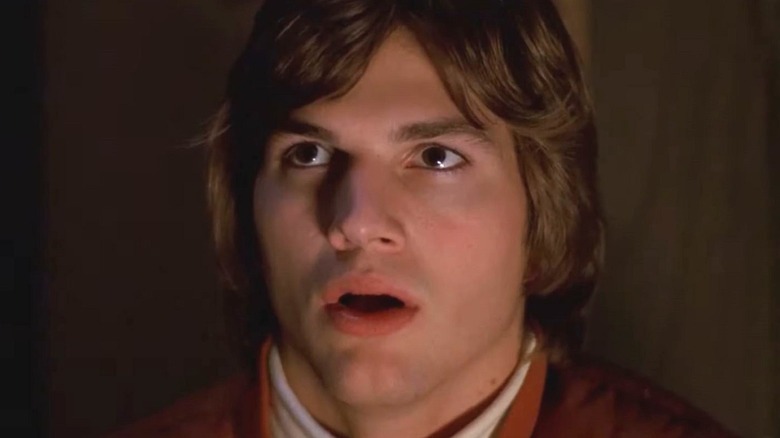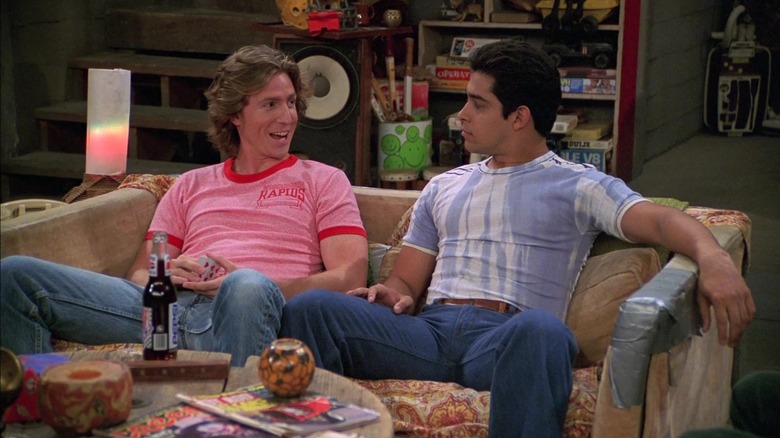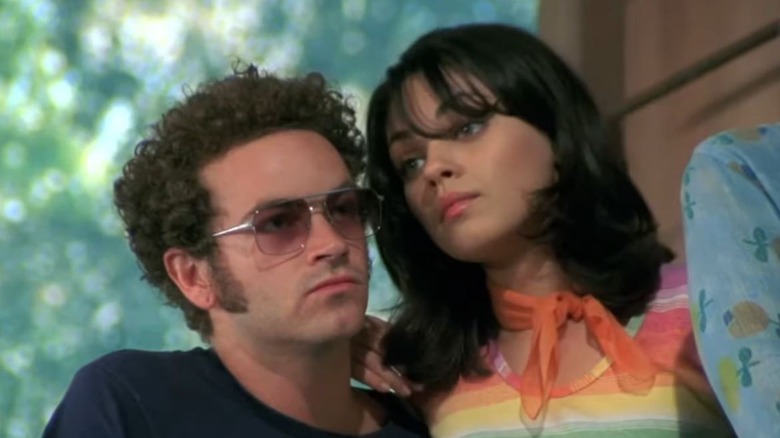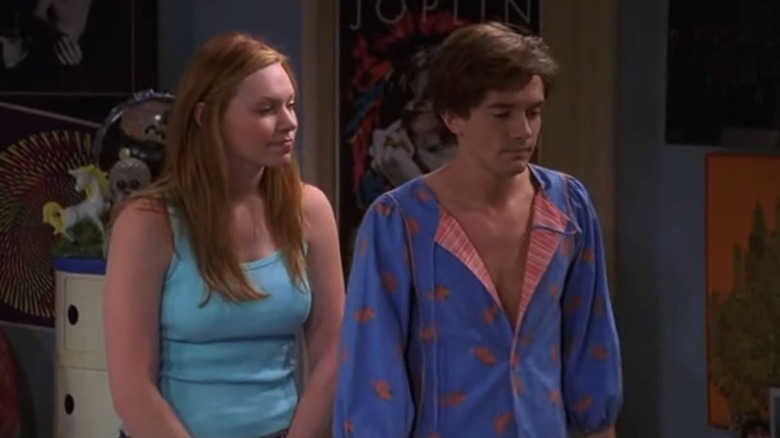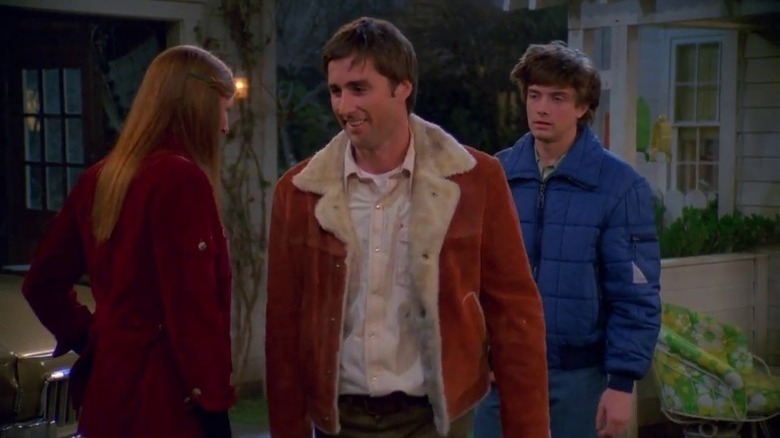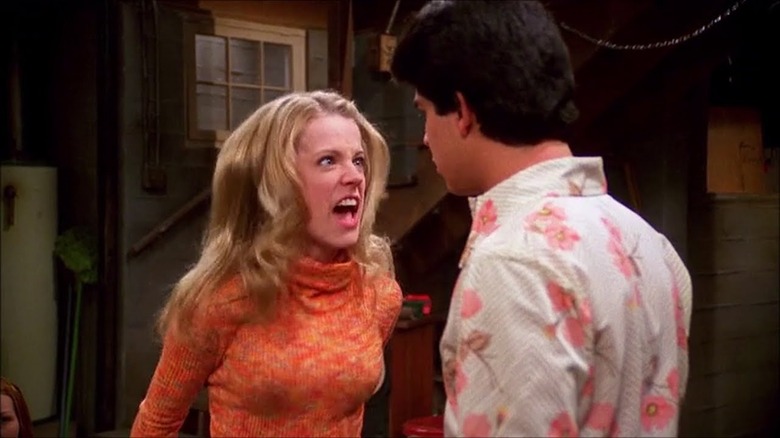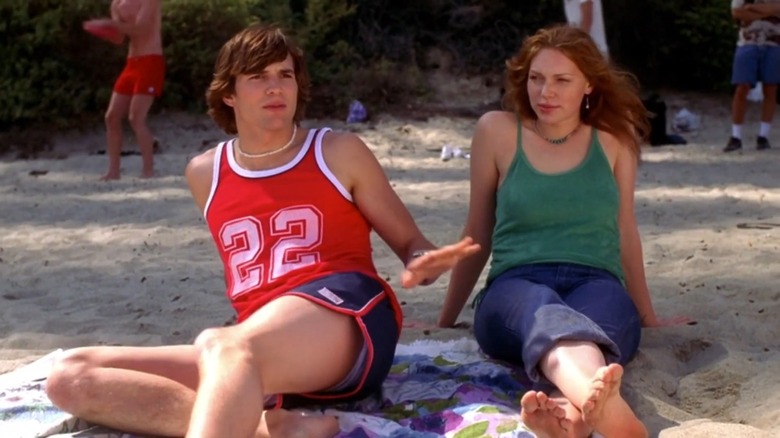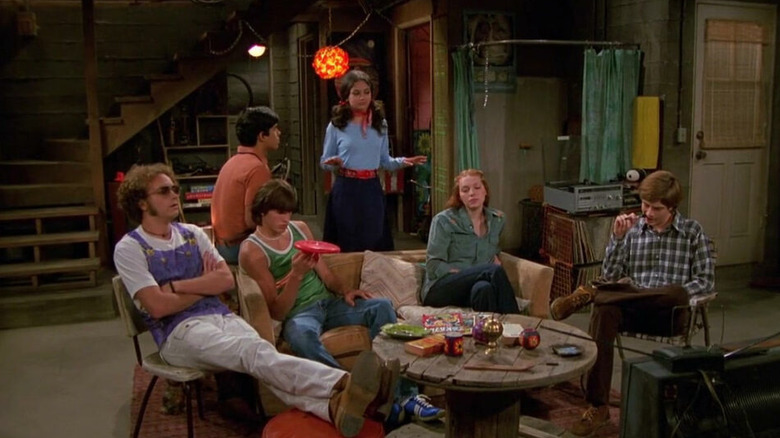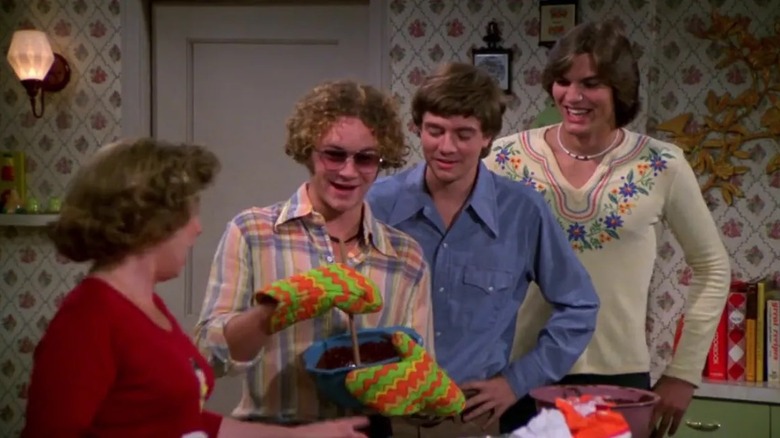Every Season Of That '70s Show Ranked
Originally hitting screens in 1998 but set decades earlier, "That '70s Show" is a throwback series that somehow still holds up even in the modern day. The sitcom revolves around a band of teenagers who frequently hang out in the basement of the central character, Eric Foreman (Topher Grace), to partake in certain illicit substances. From the awkward Eric and fiery redhead Donna (Laura Prepon) to ill-witted Kelso (Ashton Kutcher), beautifully vain Jackie (Mila Kunis), foreign exchange student Fez (Wilmer Valderrama), and authority-distrusting Hyde (Danny Masterson), there's something to love about every member of Point Place. A typical gang of friends gathering together to escape the boredom of their typical American households, the show pulled viewers in with its relatability, reminding us all of our own adolescent years.
One of the show's token features is the time period it pulls from. From the wardrobe and setting to storylines and dialogue, everything about "That '70s Show" screams nostalgia, a brilliant submergence into one of the grooviest eras in history. Even the episode titles pay homage to the hippie-saturated decade, with many named after legendary bands like the Who, Queen, the Rolling Stones, and Led Zeppelin. It was a masterpiece of relatability, and entertainment, through and through. That being said, some seasons were distinctly better than others. Here are those seasons ranked from worst to best.
8. Season 8
There's truly no explanation needed for why Season 8 is ranked last, but if you need a quick memory jog, this is the one without Eric. At the end of Season 7, he decides to make a departure from Point Place in order to go work as a tutor for one year in Africa, earning him a college scholarship upon his return. While this was the reasoning written into the show to explain his sudden exit, the true story is that Topher Grace had felt his residence on "That '70s Show" was overstayed, and it was time to pursue other roles (via IndieWire), specifically in film.
While the show tried to patch this gap by filling Eric's shoes with new character Randy Pearson (Josh Meyers), it definitely wasn't the same after that. There's nothing wrong with Randy — he's a pretty cool dude, but he's just not Eric. While it's an ensemble cast, and every character brings something great to the show, Eric was really the one holding everything together. Some shows may be able to get away without their main character, but "That '70s Show" definitely was not one of them. The effort came up short, like a shallow and hasty attempt to keep the series alive for one more season. Let this be a lesson to all series whose central cast member decides it's time to say goodbye. Don't cling to scraps. Cut your losses and go out with dignity.
7. Season 7
Season 7 was somewhat the real beginning of the end for "That '70s Show." It was the last season with Eric, and it was apparent that the show had almost run its course. The storylines were starting to get tired, and the characters seemed to just be stuck in the same old rut, with no end in sight.
As usual, Eric and Donna still have no idea what to do with their relationship. They're no longer married, but they're still together, and it's just confusing for everyone. Hyde and Jackie are still struggling with feelings for each other, ending with Hyde following her to Chicago, where he catches her with Kelso. It's the same love triangle from the first couple of seasons of the show, but with none of the originality. Everyone's futures seemed to be up in the air, while also reverting back to the same old.
To be fair, there were some new elements introduced in the season. Hyde starts to run his father's record store, and Red (Kurtwood Smith) opens up a muffler shop. Kelso becomes a father and reflects on how he treats women, so there was at least some character growth. However, these really just seem like empty stabs at ingenuity to mask the growing staleness of the series. It's not necessarily boring, but it's not the most entertaining.
6. Season 6
Season 6 is where the first inklings of a real downward trend start to take root. One of the main storylines of the season is Eric and Donna's move away from Point Place. This does get put on hold due to Red's heart attack, but it still floats in a will-they-won't-they space for a while. This becomes pretty hard to get into though, considering the audience should assume that this move won't actually happen, given that the show and all the rest of the characters are rooted in Point Place.
Not only is this storyline pointless, but it's also a little sad. Red is sick, and Eric and Donna are having to compromise their dreams. "That '70s Show" is supposed to be a light-hearted good time, but things get a little too serious in this season, and the fun is somewhat zapped out. There's also the fact that Jackie is rejected by both Hyde and Kelso in this season, and while it's refreshing to see the tables turned on her for once, it also just doesn't sit right.
The one good storyline in this season is Fez's attempt to avoid deportation by fake marrying Eric's sister, Laurie (played by Lisa Robin Kelly for the first five seasons and Christina Moore in Season 6). This arc is full of fun gags such as Fez getting mad about Laurie not acting like a real wife, and Red having to help with their INS interview, despite disapproving of the whole situation. Overall, the season is pretty average though.
5. Season 4
At this point, "That '70s Show" had found its groove, and there's nothing to say about storylines or characters getting tired. However, it isn't the best in that it's just kind of depressing. Eric and Donna aren't together in Season 4, and it's just sad to see the two love birds apart.
Eric is having a particularly rough go of it which is also a little hard to watch. Meanwhile, Donna rebounds with Kelso's brother, Casey (Luke Wilson), and it's clear that the two just aren't right for each other. It seems like the show was just trying to break from the formula a bit, but it was a little too jarring at times. It was a nice little comfort to have Wilson on the show during those dark times, though.
The other storyline that doesn't really sit right is Fez's new relationship with a woman they call "Big Rhonda" (Cynthia Lamontagne). While it was perhaps more of an acceptable, light-hearted gag for its time, the fat-shaming and downright bullying really haven't aged well. Watching it back now is downright brutal and cringe-inducing.
4. Season 3
Season 3 was a pretty average season by all measures. It was no longer new, but it was still original, and found some good plots to dig out here and there. It had perhaps lost a little bit of its shine, but not through any fault of its own. It could've branched out from the formula a bit, but then again if it's not broken, why fix it? The characters and storylines were all fairly entertaining, and it was just an all-around good time.
At the beginning of the season, Hyde gets out of jail, and that's when Red really starts to show his true colors. His blind rage was really amusing to witness, though probably not as fun for Hyde and Eric. Viewers could definitely get a kick out of it though, safe in the confines of their homes, far, far away from the Foreman residence.
Meanwhile, Eric and Donna are still in a new and exciting relationship, planning their future together and building anticipation of what's next for the young couple. The real kicker of the season though was Fez's relationship with Caroline (Allison Munn), who turns out to be a little on the wilder side. Her scenes were particularly outrageous, and downright gut-busting at times.
3. Season 5
Season 5 was really solid for a couple of reasons. At the beginning, Eric goes to California to bring Donna back to Point Place, which is a fun little way to kick things off. By now, the lingering depression of their Season 4 breakup has faded and is replaced with Eric's tenacious attempts to win Donna back. It's a nice little revert to the adorable will-they won't-they of the first season, but with fresh context to accompany it, so it's not just recycling storylines.
The other great thing that happens here is that Hyde and Jackie start to hook up. This is a really interesting turn for the series because it came out of nowhere. Does the grungy rebel win the heart of the pretty, popular girl? It's a trope that's been used before, but for some reason, it just seemed really fresh and unexpected with these particular characters. All of sudden, we've got a new underdog couple to be rooting for, instead of Eric and Donna taking up all the romantic spotlight.
While the show wasn't necessarily getting stale yet or in need of rejuvenation, the season was full of refreshing, delightful surprises for audiences. Other treats sprinkling the season include Donna having to go to Catholic school as punishment for running away to California, Kitty thinking she's pregnant (but actually just having menopause), Kelso deciding to become a police officer, and Fez losing his virginity. It's banger after banger with this one!
2. Season 1
The first season was a fabulous introduction to the loveable world of Point Place. Set nearly three decades before its making, the show was a dip into nostalgia for many viewers, but still somehow relatable to those barely old enough to meet its PG-14 rating. Everyone could relate to it, and everyone could find something to love.
Audiences got to know all the personalities the show had to offer, from the fun-loving, teenage rascals of the basement to their classic, conventional nuclear family parents. Every storyline was fresh, and there was nothing but a bright future ahead for every character. It was all potential, with nowhere to go but up. From Eric's endearing crush and pursuit of the beautiful girl next door to Kelso's goofy antics, Hyde's cynicism, and Jackie's mean girl routine, there was nothing but hilarious, original content ripe for consumption.
Though the show was still finding its footing a bit, and it hadn't yet established itself as the classic retro sitcom that it would eventually be acclaimed for, it was still an amazing debut. Perfectly imperfect in its own way, allowing viewers a new chance to dip their toe into the past, while cracking some laughs in the present.
1. Season 2
While Season 1 was a great start, Season 2 was able to follow up the act with surprisingly satisfying results. It offered everything viewers loved about the first season, only bigger, and better. The show was really starting to find its groove, with any leftover loose footing resolved, and tons of uncharted territory left to cover.
With Season 1 already under their belts, and the characters and general world of Point Place now established, the show didn't have to worry about introductions or explanations. The audience was familiar enough that the show could start to branch away from the basics, and really get into the nitty-gritty of things. It was clear where the show was coming from, but unclear as to where it might go from there. It was all anticipation and no exhaustion.
Season 2 was chock-full of great, inventive storylines. Kelso gets into a love triangle with Laurie and Jackie, Donna makes the transition from her innocent girlhood to a rebellious teenage phase (much to Eric's delight), Hyde moves into the Foreman house, and Midge (Tanya Roberts) and Bob (Don Stark) start to get into their swingers era. It was nothing but a fun-loving, ridiculously good time, and so much more left to go!
